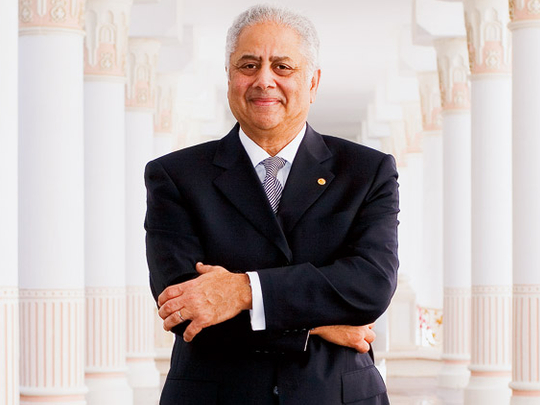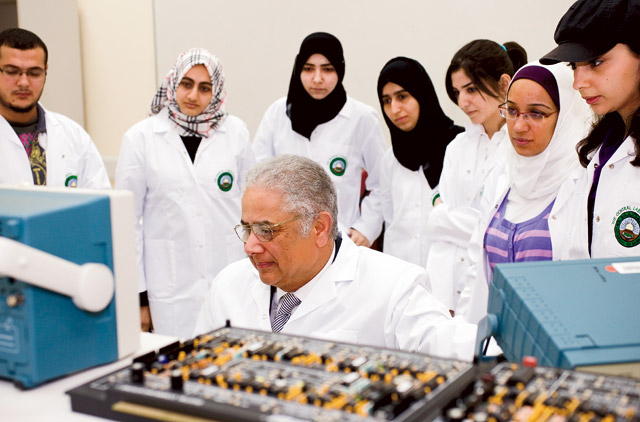
Appearing on Canadian television after receiving a grant from the government of Toronto for his research in wireless communication systems in 1975, Professor Samy Mahmoud - then an assistant professor in the Faculty of Engineering in Carleton University, Canada - was asked to describe the nature of his work to the audience. He told them he was involved in a project that was devising a small, portable hand-held phone for the public.
To many in the audience, it sounded like wishful thinking. "At that time, a car phone was something only the very rich or the police owned," says Prof Mahmoud, currently Chancellor of the University of Sharjah.
"So when I said that we were conceiving of a small hand-held phone that could be used to send images, sound and data, the show's host looked bewildered and asked: ‘Is this Dick Tracy stuff?' I replied, ‘No, it is for real'.
"So he turned back to the audience and announced: ‘Well, here is a young professor with some imagination!'"
A pioneer telecommunications researcher, Prof Mahmoud is proud of the fact that he was among the early generation of people who worked on the invention of the mobile phone - a product we now take for granted. "Today, the ubiquitous mobile phone has revolutionised the way people communicate and the cellular market is a multi-billion dollar industry. Back then, the first active device we created that could send messages weighed 12kg and was carried in a suitcase which included a big screen and a keyboard!" he laughs.
Born and raised in Egypt, his fascination for science began at a very early age. "My father was an accountant and my mother, a school teacher. Unlike my brother who took up accountancy and my sister who turned to teaching, I'd always shown a preference for science and mathematics. I loved history as well."
Though he did not inherit his father's love for numbers, what he had in common with his family was a love for teaching. "As a high school student, I would teach my younger cousins maths, and took pride in the fact that I could take up something complex and make it simple to understand. I knew then that though I would graduate as an engineer, I would still be in the teaching profession."
After completing his BSc from Ain Shams University in Cairo, Mahmoud arrived at Carleton in Canada as an international student in 1970. He completed a masters degree and PhD (1975) in electrical engineering, and then joined the faculty ranks after graduation.
From 1987, he served for a decade as chairman of the computer engineering department before being promoted to dean of the faculty of engineering in 1998. He proceeded to transform the faculty into one of Carleton's flagship programmes. He was then appointed acting president of Carleton University in November 2006.
Prior to the conclusion of his term the following year, he visited the University of Sharjah for a conference where he met His Highness Dr Shaikh Sultan Bin Mohammad Al Qasimi, Member of Supreme Council and Ruler of Sharjah. "I was inspired by his vision for the university, and was enthusiastic about being part of the exciting stages of the university's growth," says Prof Mahmoud, who then took charge as Chancellor of the University of Sharjah in July 2008.
Prof Mahmoud's main research work is in the areas of wireless communication systems and the transmission of voice and video signals over high-speed networks. He has several patents in wireless technology and optical technology and has published more than 150 papers in these fields. He has also been recognised with awards for his leading work on university-industry technology transfer.
I, me, myself
I grew up in Egypt, a country where you cannot help but develop an interest in history. Anywhere you look, you are constantly reminded of the magnificence of a great civilisation. This stimulated my imagination and I grew up with a tremendous sense of curiosity about how our ancestors lived and how they built the structures that survive even up to today.
In high school, we were taken to the south of the country, the site of the birth of Pharaonic civilisation. It was my first visit to the temples and underground monuments, and as the tour guide explained the science and engineering techniques of the pharaohs, I was deeply moved emotionally and intellectually. This visit confirmed my sense of longing to understand history. I'd always dreamt of joining the Ain Shams University in Cairo. Built in the Pharaonic architectural style, it looked so formidable that I wondered when I would be able to gain entry and be a part of it. At the time of admission, I was more nervous than excited!
I chose electrical engineering as a subject because at the time Egypt was building the Aswan dam, an ambitious hydroelectric project, and electrical engineers were in huge demand. Once my engineering studies got under way I became more interested in satellites and wireless communications.
As Egypt didn't have postgraduate studies in its universities, I left for Canada in 1972 and completed my masters and PhD from Carleton University in 1975. Leaving Egypt was a very trying time for me and my family. I thought I would be away for just three years but eventually Canada became my home for the next 35 years.
I believe the value of education lies in its power to transform both the society and the individual. Even individuals from modest backgrounds can gain upward mobility through good education and the right motivation. There are some people who make it big in life without an education but, for the average person, investing in education is the best way to improve his lot in life.
I think a good university is one that instils in its graduates a sense of pride and confidence; besides, of course, strong human values and social skills. Good universities often have professors who are excellent role models. This is why I dislike online universities. The fact that it extends the reach of education is commendable but it fails in imparting human values and social skills.
I view leadership as bringing out the best in people. It is not about management strategies; it is motivation.
I am nostalgic about my days in Cairo when as a university student, I would walk past the shores of the Nile, watching the sail boats, the reflection of the sun at sunset and the people strolling by. This scene is like a postcard memory in my mind. I am passionate about golf. Though it requires physical fitness, it is not very physically demanding. I love tennis too.
I enjoy reading. I love the history of the cosmos, and read a lot about humanity's immense changing views from the days when earth was believed to be the centre of the universe to the later discoveries we now take for granted. I am particularly fascinated by the lives of early cosmologists like Copernicus, Kepler and Brahe.
I, me, myself
Me and my love for teaching: I love students and the classroom setting. I realised early on that the secret to good teaching is to find different ways to make people comprehend what you are saying. People have different ways of learning - some learn through mathematical references, others through visual techniques, while yet others need things to be explained using examples. Mastering these different forms of teaching has been a great experience.
I also learn by teaching. I realised that some things I thought I had understood well - I hadn't really - until I began teaching. And even in my own understanding there are gaps but by teaching and preparing for teaching, I am able to bridge these gaps.
Me and my interest in psychology: I am interested in the psychology of motivation, a subject I began reading as a hobby. I am fascinated by the social setting that defines a book and the reasons why people are motivated to excel or not. This has helped me in my job especially in motivating students and guiding them to achieve their goals.
Ultimately, it was the study of psychology that propelled me into management without even me being aware of it - I was called on to take the role of head of faculty solely due to my collegial, collaborative and interpersonal skills.
Me and my career growth: When I joined Carleton as an assistant professor in the computer engineering department, more than half its faculty comprised professors who had taught me. I was therefore both overwhelmed and horrified when in 1987 I was asked to be the chairman of the department. To be in a senior position and head professors who had taught me was beyond my imagination. The department was going through a period of conflict at the time and I was asked to take on the delicate task of helping it move forward and solve the differences by talking to, persuading and gradually bringing together, the 50-plus faculty members.
During that phase, I realised that though you may not be able to solve all the differences, there are some commonalities that allow you to work together. In doing so, senior professors were willing to accept my directions because I had a middle-of-the-road approach. I realised then that authority doesn't come from punishing or isolating people. It is your moral conviction - being able to view matters positively, solving problems and helping others - that immediately earns you respect.
After a decade as chairman of the department I was keen to get back to my ‘freedom' when the Dean of the University resigned and I found myself stepping into that role in 1998. This was scary because now I had to rally a team of 160 people! Once again, it taught me something - the importance of the need to develop a vision and to ensure that each individual is a stakeholder in it.
History repeated itself in 2006 when the president resigned and the Board of Governors asked to be the acting president.
My advice to students: Adopt a positive mental attitude. Associate yourself with people who are optimistic.
I, me, myself
The objective of education is enlightenment - so that you become better human beings, and therefore more tolerant and accepting of others. Secondly, education is the only mode of gaining true knowledge. If people are knowledgeable they will not fall prey to false claims or get into the practice of stereotyping. The value of equipping students with real-world work experience inculcates the value of what they are learning in the classroom.
Being the Chancellor of the University of Sharjah is a tremendous responsibility. The job of translating a wish-list and ideas into action is something that's at the very essence of the administration. What is interesting is being able to work with 13 different colleges.
The University of Sharjah is one of a kind. I consider it to be the Harvard of the Middle East because nowhere else in the region will you find as much diversity and such world-class facilities. We will soon be setting up an institute and a degree programme for international affairs that will also include a study of the Indian subcontinent.
I have to admit that some of my students are a lot more intelligent than I am! They have sharp minds and come up with new ways of doing things I never thought of before.










